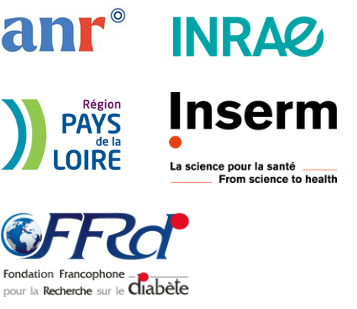Extracellular vesicles and inter-organ communication in cardiometabolic diseases (EV-Link)
Soazig Le Lay
Investigator : Soazig Le Lay
PhD student : Antria Antréou
Support staff : Josy-Anne Froger, Marianne Lafont, Margot Voisin

Extracellular vesicles (EVs) are heterogeneous membrane nanovesicles secreted into the extracellular medium. They carry biological material (proteins, lipids, nucleic acids, and mitochondria) that can be transferred to target cells, influencing their response and phenotype.
My research group addresses the role of EVs in obesity-associated metabolic complications.
To this aim, we use a translational approach combining in vitro cellular models, preclinical obesity models, and metabolic patient cohorts. Part of my research’s activity takes place in Angers, with a focus on Metabolic dysfunction-Associated SteatoHepatitis (MASH) in collaboration the HIFIH Lab (Univ Angers), in the framework of the FHU GO-NASH.
Main findings
Over the past decade, our contribution to understanding EVs’ involvement in adipose tissue (AT) remodeling in obesity include:
- Sonic Hedgehog-associated EVs modulating adipocyte differentiation
- Specific protein and lipid signatures of adipocyte-derived EV subtypes predicting metabolic responses
- Increased plasma EV concentrations correlating with BMI and HOMA-IR in obesity
- Identification of key EV-associated molecular candidates, including specific lipid speciesa and adiponectin, with potential as EV-based biomarkers or therapeutics.
Main ongoing projects
- Use adiponectin enriched-EVs as innovative therapy for diabetes.
- Identify and develop EV-based biomarkers for cardiometabolic diseases.
Partnership Projects
• Explore EVs as carriers of adipose-stored persistent organic pollutants (POPs) and their effects on MASLD (in collaboration with the HIFIH Lab-Univ Angers, IRSET-Univ Rennes, Laberca-ONIRIS)
• Investigate feces microbiota-derived EVs in MASLD severity (in collaboration with the HIFIH Lab).
Learn more about our projects
- ANR VE-S-HICL : Soazig Le Lay (2026-2030)
- Fondation Francophone pour la Recherche sur le Diabète (FFRD) : Soazig Le Lay (2023 - 2026)
- ANR EVADIPO : Soazig Le Lay (2022 - 2025)
- EVEXPONASH / Exposome Santé Inserm/Inrae : Soazig Le Lay (2023 - 2025)
Exploring adipose tissue-derived extracellular vesicles in inter-organ crosstalk: Implications for metabolic regulation and adipose tissue function. Soazig Le Lay, Philipp E. Scherer, Cell Reports 44, June 24, 2025
Extracellular vesicles are carriers of adiponectin with insulin-sensitizing and anti-inflammatory properties. Blandin A, Amosse J, Froger J, Hilairet G, Durcin M, Fizanne L, Ghesquière V, Prieur X, Chaigneau J, Vergori L, Dray C, Pradère JP, Blandin S, Dupont J, Ducluzeau PH, Dubois S, Boursier J, Cariou B, Le Lay S. Cell Rep. 2023 Aug 29;42(8):112866. doi: 10.1016/j.celrep.2023.112866. Epub 2023 Aug 21.
Lipidomic analysis of adipose-derived extracellular vesicles reveals specific EV lipid sorting informative of the obesity metabolic state.Blandin A, Dugail I, Hilairet G, Ponnaiah M, Ghesquière V, Froger J, Ducheix S, Fizanne L, Boursier J, Cariou B, Lhomme M, Le Lay S. Cell Rep. 2023 Mar 28;42(3):112169. doi: 10.1016/j.celrep.2023.112169. Epub 2023 Mar 1.
Adipocyte-derived extracellular vesicles in health and diseases: Nano-packages with vast biological properties.Le Lay S, Rome S, Loyer X, Nieto L. FASEB Bioadv. 2021 Mar 4;3(6):407-419. doi: 10.1096/fba.2020-00147. eCollection 2021 Jun.
Phenotyping of circulating extracellular vesicles (EVs) in obesity identifies large EVs as functional conveyors of Macrophage Migration Inhibitory Factor. Amosse J, Durcin M, Malloci M, Vergori L, Fleury A, Gagnadoux F, Dubois S, Simard G, Boursier J, Hue O, Martinez MC, Andriantsitohaina R, Le Lay S. Mol Metab. 2018 Dec;18:134-142.Characterisation of adipocyte-derived extracellular vesicle subtypes identifies distinct protein and lipid signatures for large and small extracellular vesicles. Durcin M, Fleury A, Taillebois E, Hilairet G, Krupova Z, Henry C, Truchet S, Trötzmüller M, Köfeler H, Mabilleau G, Hue O, Andriantsitohaina R, Martin P, Le Lay S. J Extracell Vesicles. 2017 Apr 10;6(1):1305677. doi: 10.1080/20013078.2017.1305677. eCollection 2017
Funding
- Agence Nationale de la Recherche
- Fondation Francophone pour la Recherche sur le Diabète
- Inserm
- INRAE
- Région Pays de la Loire






